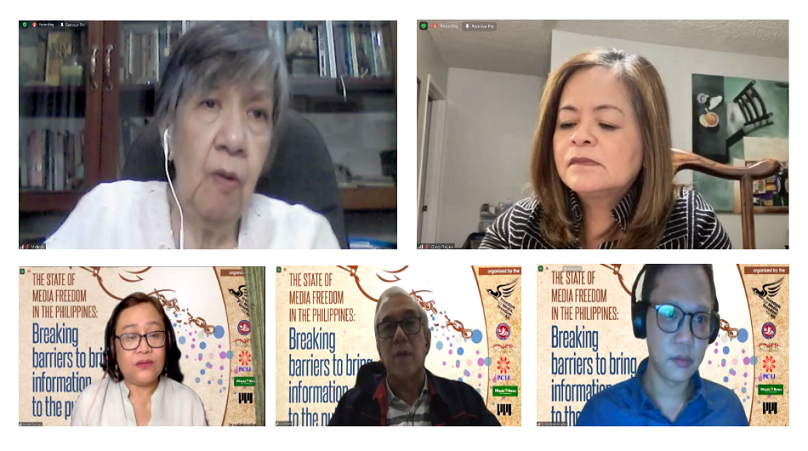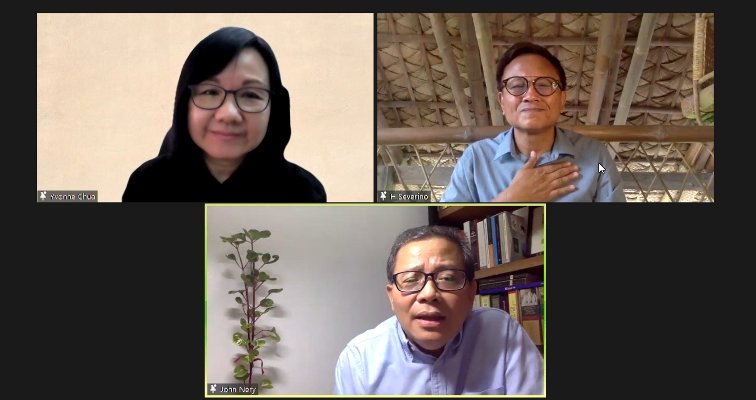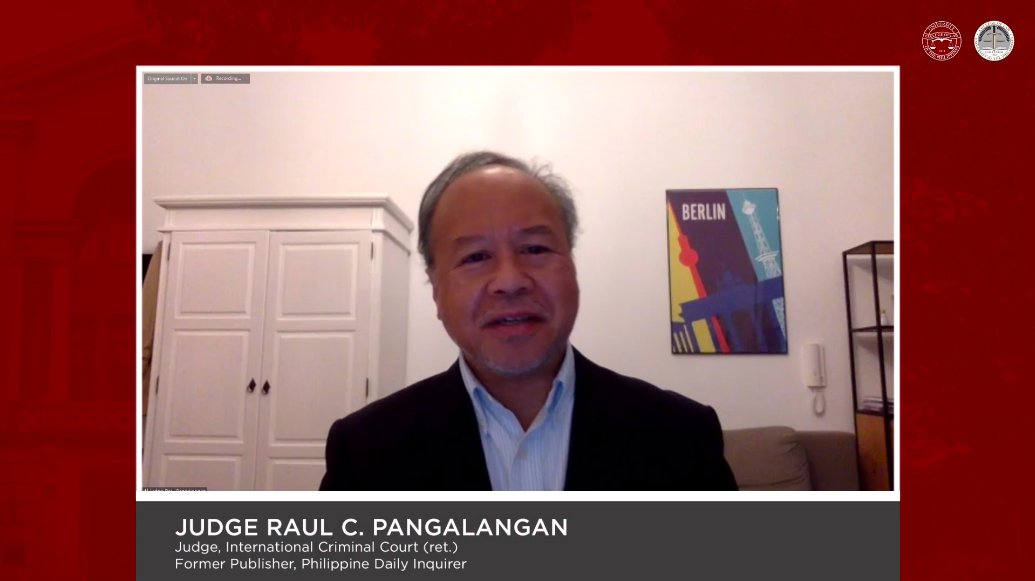
From top left clockwise: Melinda
Quintos-de Jesus – executive director, CMFR; Ging Reyes – head, ABS-CBN
Integrated News and Current Affairs; Jonathan de Santos- chairman, NUJP;
Ruperto Nicdao Jr. – chairman, KBP; and, Amalia Cabusao – vice president, PPI
Journalists in the country continue to face many threats today and freedom of the press will depend on how much support it gets from the people, according to Melinda Quintos-De Jesus, executive director of the Center for Media Freedom and Responsibility (CMFR).
In an online forum to mark World Press Freedom Day on May 3, De Jesus stressed that the fight for press freedom does not rely solely on its practitioners, but is also a challenge to the rest of society.
“The press can do very little unless the people themselves know that it is really up to them to speak up and to say: We would like to get this information, we would like to have this direction, we would like to be served by the government that we’re paying for,” she said.“If the people are going to be afraid, I think we have lost so much about what we are fighting about.”
Data from the CMFR and the National Union of Journalists of the Philippines (NUJP) showed that of the 234 journalists and media workers who died in the country since 1986, at least 156 were killed in the line of duty. From the start of President Rodrigo Duterte’s term on June 30, 2016 to April 30, 2021, CMFR data shows that 19 journalists were killed and 204 faced lawsuits and experienced threats, intimidation, and other forms of harassment.
In a forum titled “The State of Media Freedom in the Philippines: Breaking barriers to bring information to the public,” the speakers detailed the dangers media practitioners have had to confront in the course of their work.
Jonathan De Santos, NUJP chairman and news section head of Philstar.com, narrated instances of journalists being red-tagged, arrested over mistaken identity and other accusations, and killed in line of duty. On top of threats of personal harm, journalists have also had to worry about losing their jobs as advertising revenues dried up, forcing news organizations to either lay off employees to stay afloat or shut down completely.
The COVID-19 pandemic has made the situation worse, especially for community newspapers, which had been struggling financially over the past years due to competition from online news sites. Amalia Cabusao, editor-in-chief of Mindanao Times and vice president of the Philippine Press Institute, said community papers have been “gasping for breath,” reducing the number of pages and laying off correspondents to survive.
ABS-CBN fiasco
The speakers noted how press freedom had taken a beating with the closure of broadcasting giant, ABS-CBN in May 2020, right when the pandemic was just beginning to hit the country in full force.Ruperto S. Nicdao, Jr., chairman of the Kapisanan ng mga Broadkaster ng Pilipinas (KBP), said the decision to deny the renewal of the network’s franchise was clearly a political decision that served to deny the public access to much-needed information at such a crucial time.
Citing research by Nielsen and Kantar Media, Nicdao said that television viewership peaked around 23%to 24% when the pandemic began, but plummeted to pre-COVID-19 level of 13.8% to 10% when ABS-CBN was forced out of the air.
“Millions of Filipinos just tuned out of TV … that’s a big drop in overall TV viewing,” he said.“Because of the closure of ABS-CBN, most Filipinos are not getting the information that ABS-CBN should have been providing.”
The KBP executive said the ABS-CBN case sent a chilling effect on other networks because “it doesn’t stop government from coming up with issues against you so we’re kind of careful.”As a result, networks plan to lobby Congress to change the law on the granting of broadcast franchises, noting that the United States, the United Kingdom and Japan do not require the legislature to approve such permits to operate.
“Legislative franchising compromises the freedom of the press and expression. The ABS-CBN experience really gives us something to think about, especially when our franchises are up for renewal,” Nicdao said.
With no franchise, ABS-CBN shifted to the digital platform. Ging Reyes, head of ABS-CBN Integrated News and Current Affairs, said the inability to broadcast over radio and television forced the network to lay off one-third of its workforce, cancel its current affairs programs, and close news bureaus in the provinces.
“Despite the challenges and despite the risks, many of us still believe we have to fulfill our obligation to the public. If we remain true to those institutional and individual values, we will always muster the courage to keep going, with or without a franchise,” Reyes said.
What journalists should do
De Jesus stressed the need for media to work together to fight forces that restrict press freedom and pose danger to media workers in the country as she urged journalists to “find hope and strength in the global solidarity expressed by World Press Freedom Day.”
“Let us use the news as a way out of this dark place. Let us shine the light on the goodness that Filipinos have shown in the midst of great suffering.Indeed, how can we counter the forces of anger and hate than to report the simplicity of doing good?” she said.
This was echoed by Reyes, who called on journalists to “do some reflection and introspection” about weaknesses in the industry that could be corrected.
“We can be a little more courageous as media, as journalists. We can revisit our values.We must be less afraid,” she urged.


